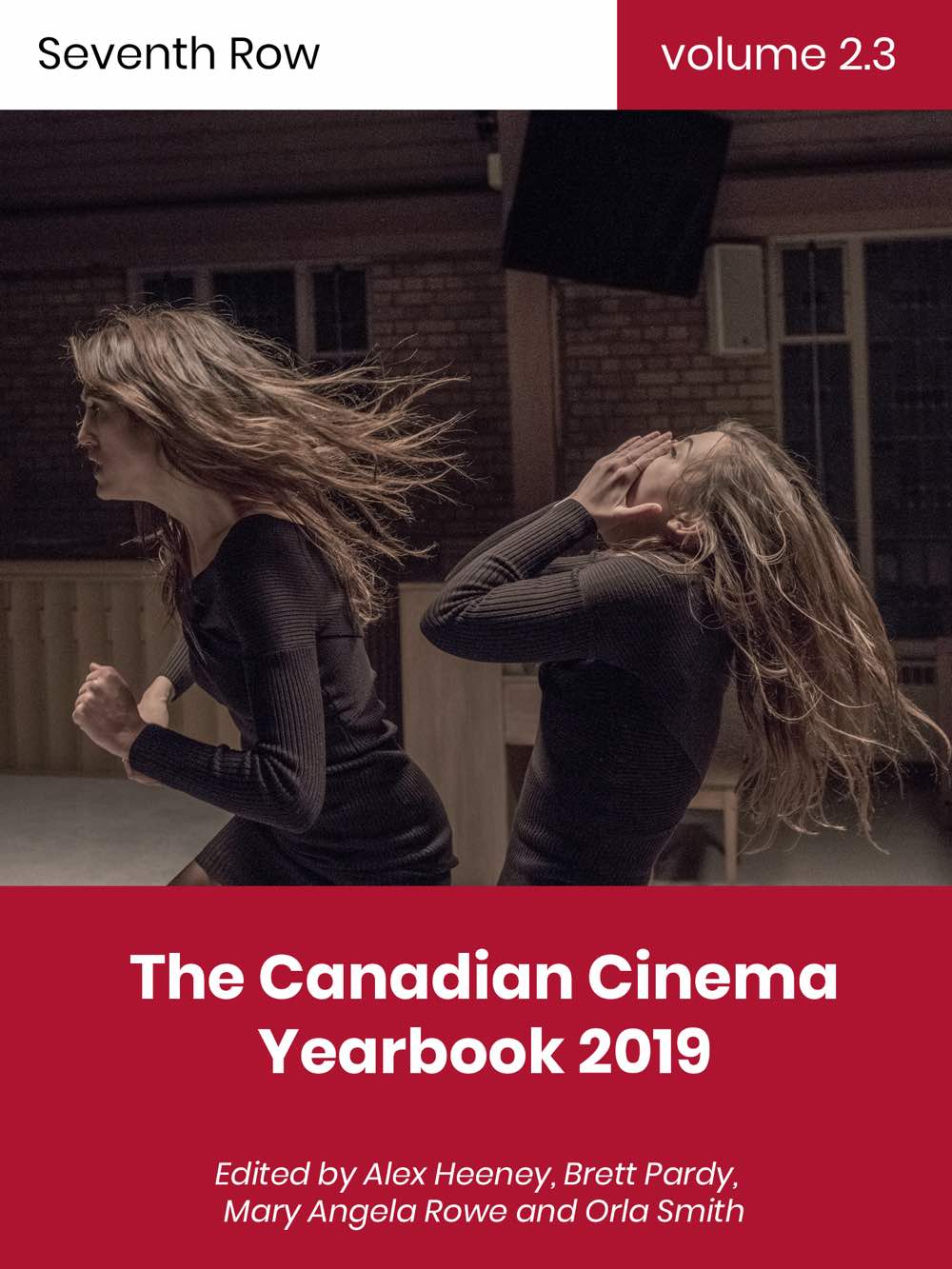C.J. Prince picks the best shorts at TIFF 2021, which includes new works from Seventh Row favourites Albert Shin and Zacharias Kunuk.
Click here to find all of our TIFF 2021 coverage and sign up to our TIFF newsletter.
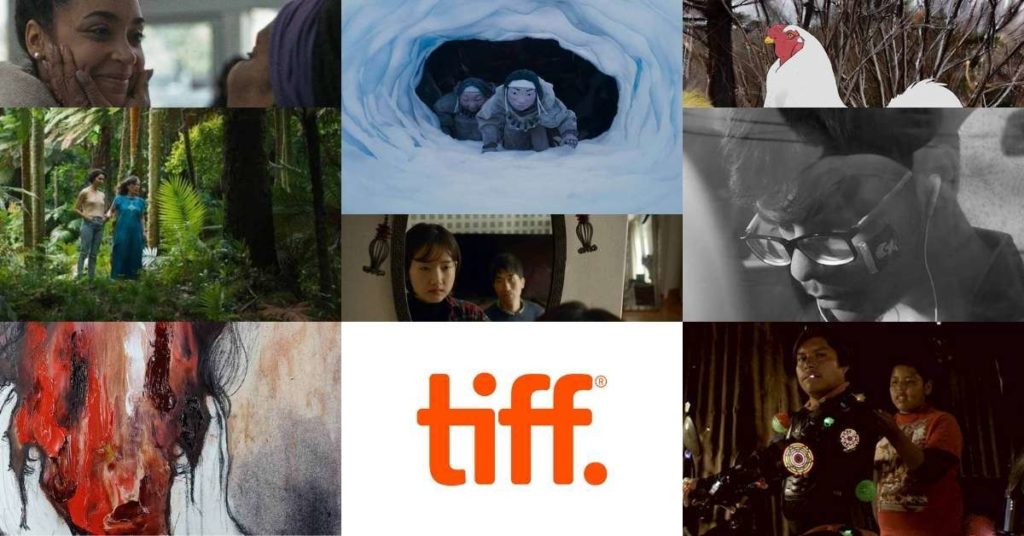
We’re running a daily TIFF 2021 newsletter to give you all our reactions to the best new films as they premiere. Click here to sign up for free.
Every year, TIFF’s Short Cuts programme provides an opportunity for viewers willing to look past the buzzy feature films getting all the attention. With few well-known options for watching short films year round, Short Cuts gives audiences the chance to discover a batch of new international filmmakers, some of whom are at the starting point of their careers. Because of the lack of access and attention paid to short films (at least in comparison to features), a good short is almost always a hidden gem: titles like The Burden, No Crying at the Dinner Table, and Still Processing stood out from TIFF’s lineups in prior years for those who actually watched them. That element of discovery and personal connection is part of what makes the festival experience so exciting, and Short Cuts always provides that experience more than once in a given year.
While this year’s list of highlights in Short Cuts covers both Canadian and international works (last year’s focused only on Canadian films), Canadian filmmakers had a strong showing, making up a majority of this list despite comprising less than half of the programme.
With TIFF holding a hybrid edition this year, people across Canada have the chance to catch any of the five programmes from their home. If it’s your first time checking out Short Cuts, use these ten films as a guide for where to find some of the true surprises at this year’s festival.
Angakusajaujuq – The Shaman’s Apprentice (Zacharias Kunuk, Canada)

Inuk filmmaker Zacharias Kunuk (most famously known for Atanarjuat: The Fast Runner, 2001) delves into animation with his latest work Angakusajaujuq – The Shaman’s Apprentice). He uses stop motion to show a shaman and her apprentice as they enter the underworld to help cure an ailing man. Kunuk has no issues with the transition into animation. Shooting in Scope with multiple closeups, he puts an emphasis on facial expressions to create a more cinematic experience. It also provides him an opportunity to be more imaginative, creating vivid portrayals of massive, man-eating creatures and people separating their physical and spiritual selves that would be difficult to pull off with live action. Even more of a surprise is how assured and playful Kunuk’s direction is, using the liminal space of the underworld to blend in 2D drawings and other forms of animation before using a series of tableaus for the climax. It’s one of the most engaging shorts in this year’s programme.
Programme 1 screens digitally on Friday, September 10 at 5 pm. Viewers will have 4 hours to watch the programme after it starts. Tickets are available here.
Anxious Body (Yoriko Mizushiri, France/Japan)

An exercise in unnerving viewers, Yoriko Mizushiri’s Anxious Body unfolds as a series of animations that distort and warp the human body: tape peels off of skin, a finger bends backwards to an impossible degree, body parts turn into snakes, and a dreaded hangnail gets torn. Mizushiri’s approach fascinates as much as it disturbs, with the imagery becoming more abstract as it reduces the form of a person down to lines and shapes. More sensitive viewers might wince at some parts of Anxious Body, although, in this case, Mizhushiri would be eliciting an impressive response given how much of the imagery is driven by what is suggested rather than shown.
Programme 3 screens digitally on Sunday, September 12 at 3 pm. Viewers will have 4 hours to watch the programme after it starts. Tickets are available here.
Bhai (Hamza Bangash, Pakistan/Canada/United Kingdom)
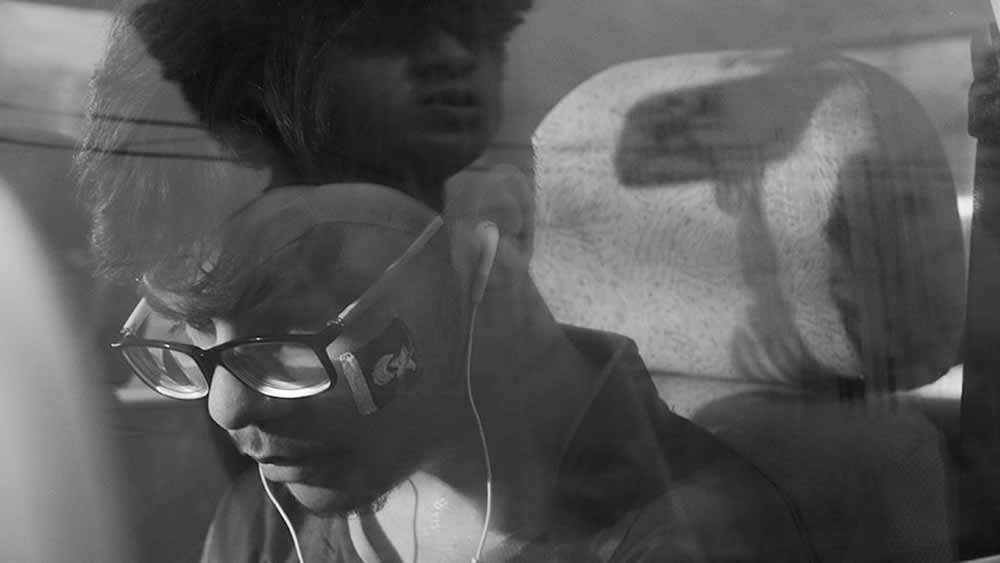
Set over seven minutes outside a restaurant, Hamza Bangash’s Bhai uses a chaotic moment in time to establish a complex relationship between brothers Hassan (Mohammad Ali Hashmi) and Taimur (Ayan Javaid), who is on the autism spectrum. While Hassan grabs food for both of them, Taimur experiences an episode while he waits in the car. Bangash starts from the perspective of Taimur, where the boxy Academy ratio emphasizes the limited space in the vehicle. Closeups and quick cuts of activity outside the car, be it screaming children or a street musician with a pet monkey, add to the tension while the soundtrack layers everything on top of each other to a deafening level.
The episode triggers a conflict with a stranger, at which point the perspective shifts to Hassan watching everything from a distance at the restaurant. The way Hassan handles the situation reveals insight into his emotional state: he must juggle his roles as brother and protector alongside his feelings of regret in how he fails to live up to those responsibilities. Through brief yet strong impressions of these brothers’ inner lives, Bhai shows plenty of depth below its chaotic surface.
Programme 3 screens digitally on Sunday, September 12 at 3 pm. Viewers will have 4 hours to watch the programme after it starts. Tickets are available here.
DUST BATH (Seth A. Smith, Canada)
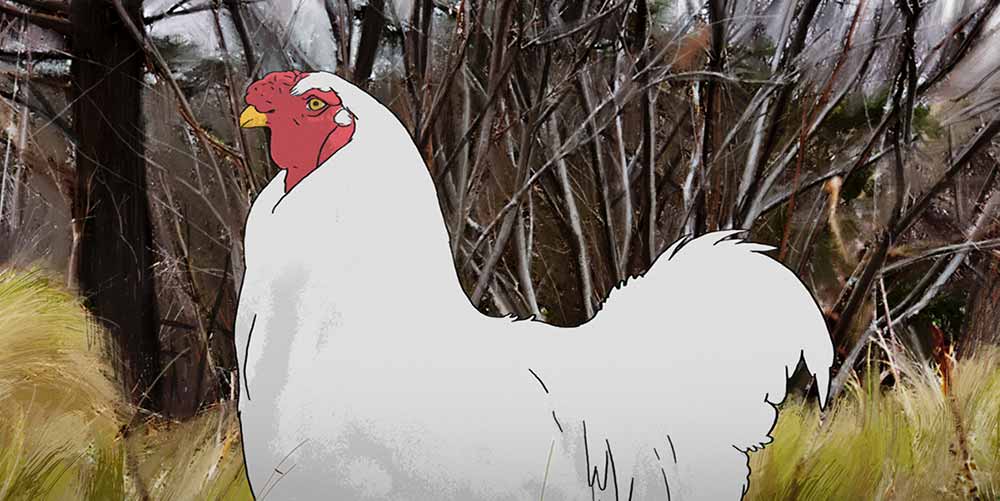
Seth A. Smith animates a rooster as it gets existential, subtitling its crows and other sounds with musings about life, death, pain, and the pleasure of being devoured by one’s own enemy. The concept alone is a short dose of dark comedy; with a two-minute runtime, it’s one of the easiest watches in the entire lineup. But this rooster’s thoughts imply something darker; its lofty thinking about being butchered and eaten comes across as an animal trying to rationalize its inevitable fate in a world dominated by hungry, human predators.
Programme 4 screens digitally on Monday, September 13 at 1 pm. Viewers will have 4 hours to watch the programme after it starts. Tickets are available here.
Fanmi (Sandrine Brodeur-Desrosiers, Carmine Pierre-Dufour, Canada)
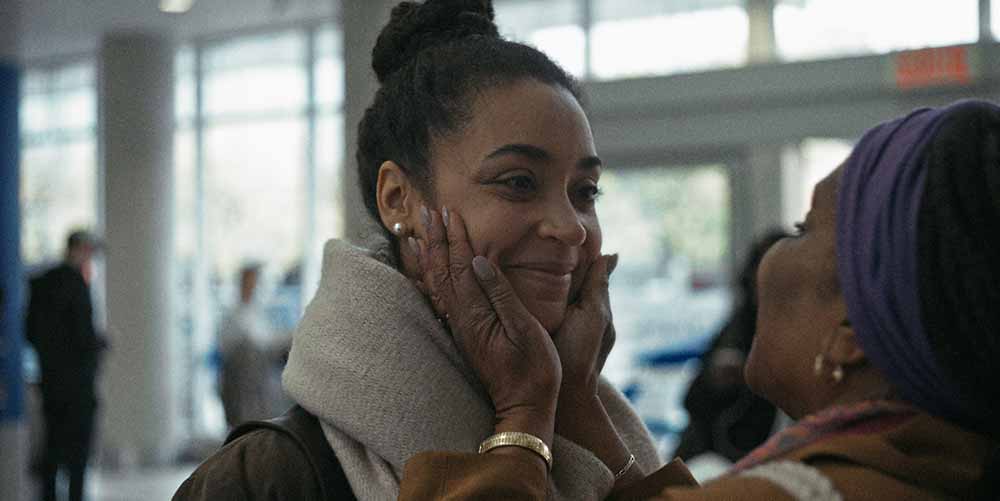
In Fanmi, a young woman (Marie Évelyne Lessard) dealing with a breakup gets a quick surprise visit by her emotionally distant mother (Mireille Métellus). At first glance, directors Sandrine Brodeur-Desrosiers and Carmine Pierre-Dufour set things up as an awkward dramedy, with the mother’s judgmental glances and inability to console her child establishing a tension between the two.
But as we learn about the reason for the mother’s visit, Fanmi transitions into tragedy, expanding into an affecting portrait of a family stumbling as they try to communicate and be vulnerable with each other. Métellus gives a terrific performance as the secretive mother, whose hardened facial expressions and body language form cracks in subtle ways before she drops her guard and reveals a tender emotional core in a standout sequence.
Programme 1 screens digitally on Friday, September 10 at 5 pm for 24 hours. Viewers will have 4 hours to watch the programme after it starts. Tickets are available here.
Motorcyclist’s Happiness Won’t Fit Into His Suit (Gabriel Herrera, Mexico)
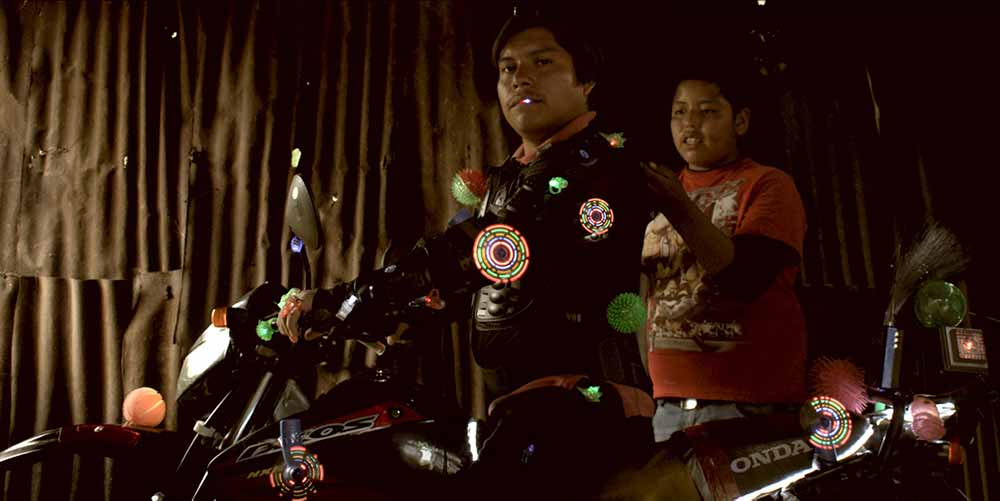
Gabriel Herrera’s short is one of the most distinctive and best looking films in this year’s lineup. Shot on 16 mm in a 1:1 ratio, at first glance, Motorcyclist’s Happiness Won’t Fit Into His Suit looks like an off-kilter story of a young man showing off his motorcycle to the camera. The children around him stare in awe and act subservient to him, help him put on a leather jacket, and see if the man might ever lend them his bike (he won’t). He sits under a red tent, creating a sharp contrast with the greenery of the jungle surrounding him. A narrator reads about conquerors of Mexico from the past, the words of a confident charge into the jungle spoken over the lead as he peels away with his bike. A connection forms between the ego of colonists and the motorcyclist.
It’s easy to get caught up in the aesthetics, given the unconventional aspect ratio and the dominant red/green colour palette, but get past them, and you’ll see Herrera’s unique ambition. He retells colonial history through a mish mash of past and present, swapping out the once lauded discoveries of the New World with the consumerist toys and items that have come to define us today. Herrera’s direction suggests that we can only approach the past through the present, and in order to learn from what came before, we must understand it has evolved and integrated itself into our daily lives today.
Programme 4 screens digitally on Monday, September 13 at 1 pm. Viewers will have 4 hours to watch the programme after it starts. Tickets are available here.
Ousmane (Jorge Camarotti, Canada)
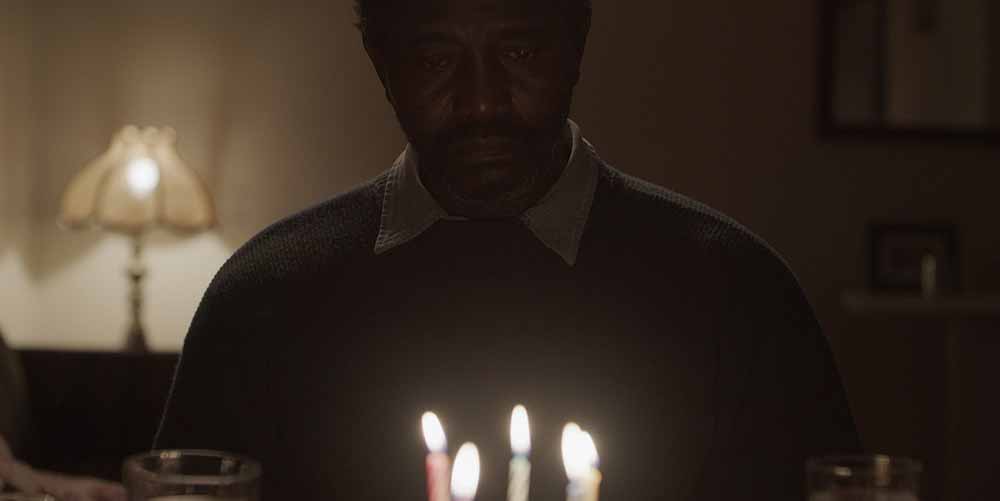
It’s difficult not to think of Jorge Camarotti’s Ousmane as a spiritual sibling to Fanmi, given they’re both from Quebec and deal with similar themes around motherhood and vulnerability within the family unit. It might be more accurate to describe them as two different sides of the same coin. Camarotti’s film follows its title character (Issaka Sawadogo) around his birthday. Feeling wistful about his family back in his home country, Ousmane spontaneously decides to help one of his neighbours, an older woman whose mental health appears to be in decline. With one of the longest runtimes in the programme, Ousmane takes its time as it develops its protagonist. The film is a rich character study thanks to Nicolas Canniccioni’s stunning cinematography and Sawadogo’s impressive performance. Camarotti’s film is one of the biggest achievements in Short Cuts this year, as it quietly builds up its story and character to a touching payoff.
Programme 5 screens digitally on Tuesday, September 14 at 3 pm. Viewers will have 4 hours to watch the programme after it starts. Tickets are available here.
Soft Animals (Renee Zhan, United Kingdom)
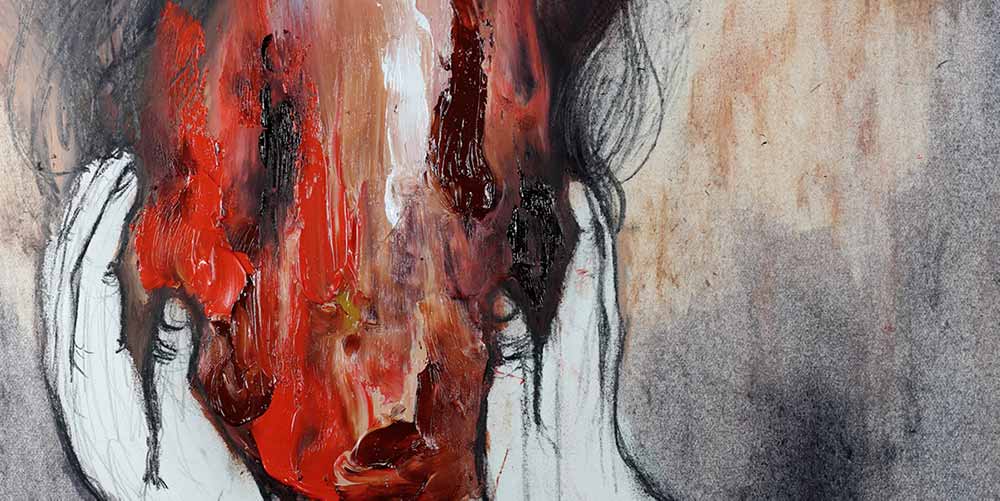
After her film O Black Hole! played in last year’s programme, Renee Zhan returns with an even shorter work that’s about as disturbing and funny. Over a scant three minutes, Soft Animals shows ex-lovers bumping into each other at a train station, exchanging pleasantries before Zhan plummets viewers into a realm of cosmic horror that makes their frayed emotions take physical form. Sketches of bodies thrash, growl, and fight, twisting and contorting into indescribable shapes and figures. Zhan’s textured animation adds a tactile feel to her work that makes her ideas all the more uncomfortable to watch. Not a lot of filmmakers can create something light and funny while evoking the likes of HP Lovecraft and Francis Bacon, but Zhan does just that.
Programme 5 screens digitally on Tuesday, September 14 at 3 pm. Viewers will have 4 hours to watch the programme after it starts. Tickets are available here.
Sycorax (Lois Patiño, Matías Piñeiro, Portugal/Spain)
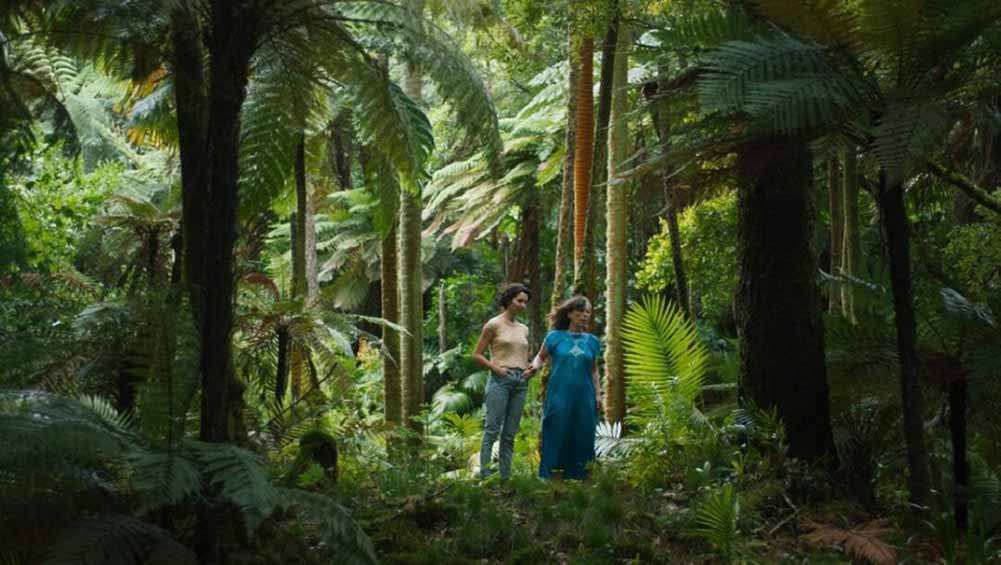
Spanish filmmaker Lois Patiño (Night Without Distance) and Argentinean director Matías Piñeiro (Viola) come together to tackle Shakespeare’s The Tempest with Sycorax, a surprising addition to Short Cuts given their history in TIFF’s more experimental Wavelengths programme. Split into two parts, the film begins with the casting process for the play, except in this version, the character of Sycorax (who’s only referenced in the original text) will have a voice.
The two filmmakers’ sensibilities pair nicely here; Piñeiro does his usual playful, meta approach to Shakespeare and Patiño’s formal rigour uses precise framing, superimpositions, and negative images to gorgeous effect. Around the halfway mark, a series of disorienting dissolves between shots of trees and waterfalls act as a transition to the piece itself, which functions as a sort of prequel to the play. This transition point also functions as the point where Patiño and Piñeiro’s styles fuse together into something fluid, blending the source material, their revisionist take, fiction, and documentary into an enigmatic experience.
Programme 5 screens digitally on Tuesday, September 14 at 3 pm. Viewers will have 4 hours to watch the programme after it starts. Tickets are available here.
Together (Albert Shin, Canada)
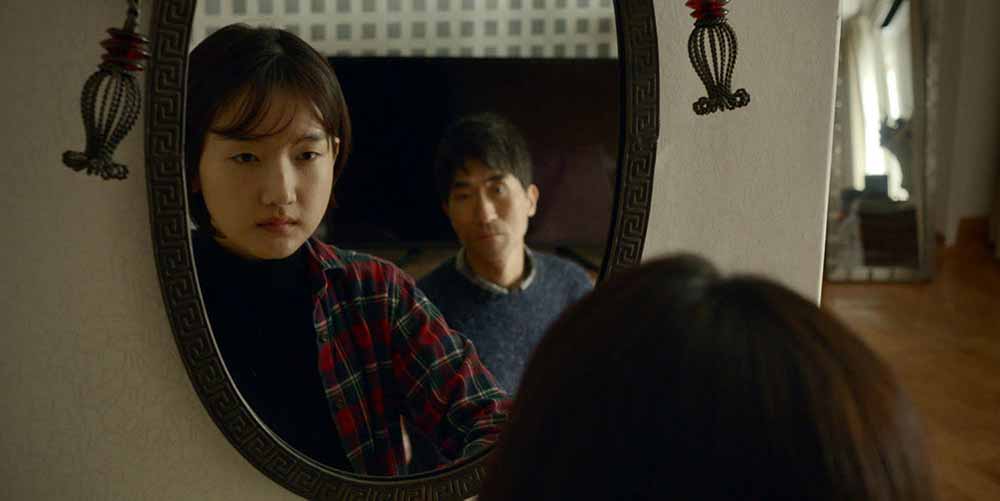
Albert Shin (In Her Place, 2014; Disappearance at Clifton Hill, 2019) returns to TIFF with a short tale of characters who come together under disturbing circumstances. A young woman (Ahn So Yo) and an older man (Kim Jae-rok) meet up at a hotel room to poison themselves, having only spoken to each other online. The purpose of their meeting is to follow through on a suicide pact they made together; we see them casually seal up the room before they begin to poison themselves with carbon monoxide.
Shin is the kind of filmmaker who always puts people first: after establishing the grim setup, his interests shift to both characters. Their exchanges start out as brief and functional, but as the day goes on, they open up to each other and reconsider their plans as their bond strengthens. The single setting and two-person cast make Together a sparse affair, although Shin doesn’t need much to communicate how powerful the simple act of reaching out can be for someone. As Together closes, the camera leaves the hotel room, revealing a vast ocean surrounding the building. It ends things on a hopeful note, showing how a simple shift in perspective can reveal an entire world of possibilities.
Programme 4 screens digitally on Monday, September 13 at 1 pm. Viewers will have 4 hours to watch the programme after it starts. Tickets are available here.
Stay in the know about TIFF 2021.
Subscribe to Seventh Row’s TIFF newsletter.
We’re running a daily newsletter during the festival: every morning, we’ll send subscribers a dispatch about all the new films we’re watching, good and bad, to let you know what’s worth keeping an eye on.
Click here to subscribe to the TIFF 2021 newsletter.
